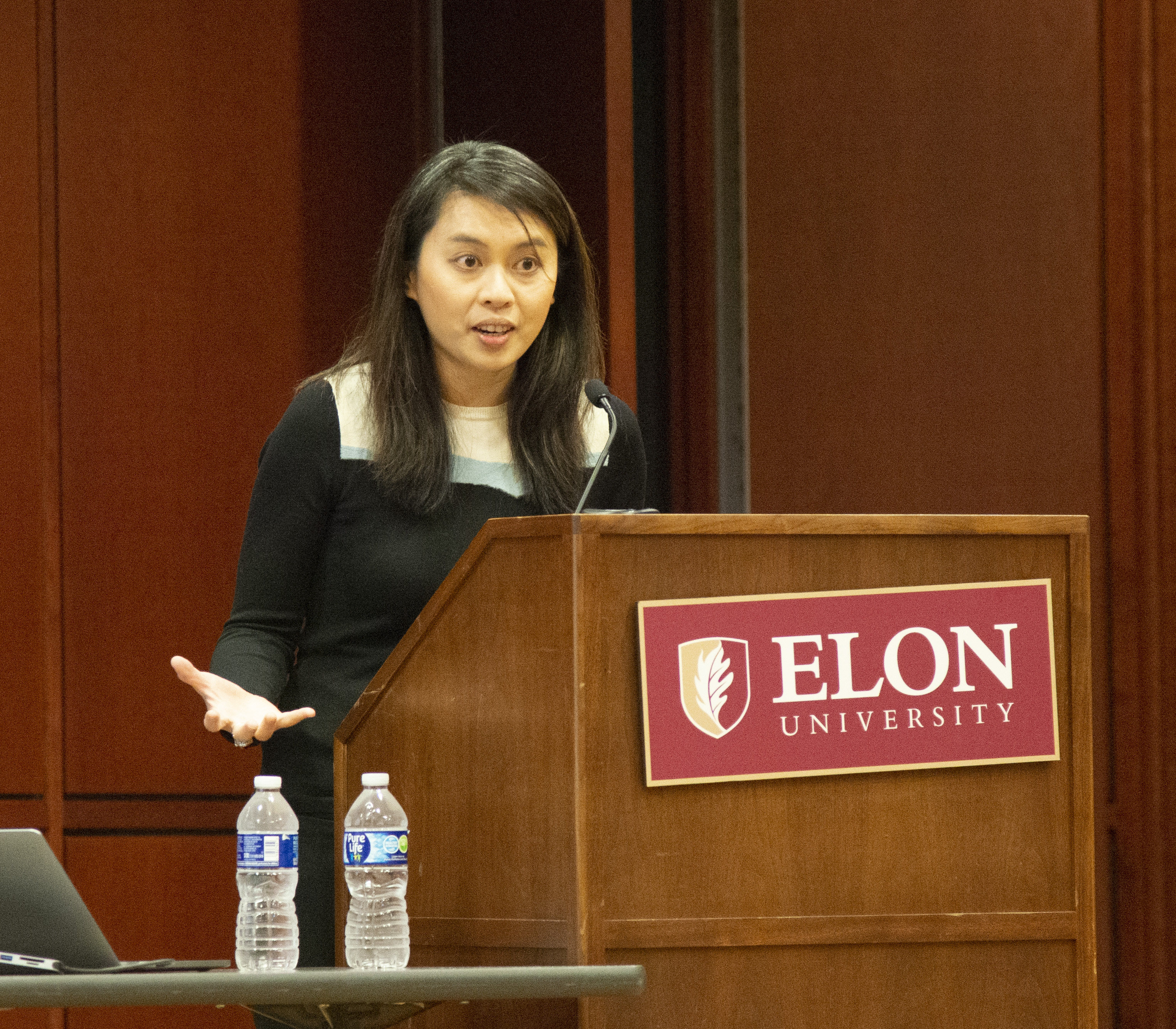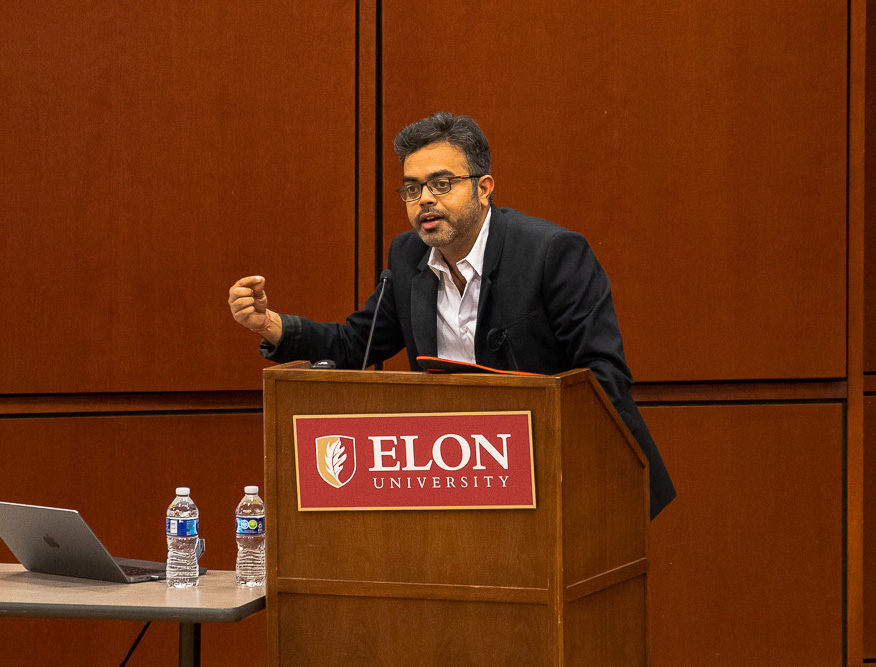MIT Media Lab graduates Nan-Wei Gong and Anirudh Sharma delivered the 2022 C. Ashton Newhall Lecture on Nov. 15 in the LaRose Digital Theatre at the Ernest A. Koury Sr. Business Center.
Two graduates of the MIT Media Lab program on Tuesday shared their insights into how collaboration and creativity paved the way for new entrepreneurial achievement during Elon’s annual C. Ashton Newhall Endowed Lecture Series in the Love School of Business.
The C. Ashton Newhall Endowed Lecture Series, named for Elon University trustee C. Ashton Newhall ’98 and hosted by the Doherty Center for Creativity, Innovation and Entrepreneurship, brings successful entrepreneurs to campus to share their knowledge and experience managing the risks and rewards of entrepreneurial endeavors.
Nan-Wei Gong graduated from the doctoral MIT Media Lab program in 2013 fully expecting to pursue a career in academia or research. In the last year of her doctoral program, Gong and a few friends pondered the question of understanding 3D localization. It was an exploration that led to the creation of 3dim Tech, which made software for mobile 3D sensing cameras.

Gong entered 3dim into the MIT $100K Competition, winning first place. And a year later, the company was acquired by Google. A brief detour away from pure STEM work was just enough for Gong to see there were a variety of opportunities available.
“That was the first taste of entrepreneurship, and it ended very quickly. But it’s the first time I realized that I don’t necessarily have to be a professor. There are different opportunities for me on the career side. So, I continued exploring it,” Gong told those gathered in LaRose Digital Theatre on Tuesday.
The next chapter of her journey was creating a music controller inspired by her background as a trained musician. This endeavor doesn’t have the same triumphant ending as the 3dim story, as Gong had trouble funding the project, and the start-up failed. She then spent time as the R&D lead for Google’s Project Jacquard, a collection of conductive threads for weaving touch-responsive textiles.
For the past five years, she has devoted the majority of her attention to her most recent venture, Figur8, Inc. Figur8 creates advanced wearable musculoskeletal (MSK) technology that combines biosensors, intuitive software and artificial intelligence to analyze and advance MSK health. The venture has raised upward of $10 million and employs 30 full-time positions, Gong said Figur8 strives to properly diagnose MSK injury and track rehabilitation.
“Our product is about creating a data report that allows everyone to quantify and control the clinical and financial outcome of musculoskeletal health,” she said.
Over the last 10 years, Gong said she’s reflected on the fact she hasn’t had a typical, nine-to-five job. But she has been empowered to give her thoughts on many issues and work on them directly.
“This is an opportunity for me to build a life and career around the industry and topics that I care about,” Gong said. “I can pick who I work with, we have a lot of control over what we do and we have 100% responsibility for what we do.”
Responsibility plays a significant role in Anirudh Sharma’s start-up, Graviky Labs, which sequesters carbon emissions from air pollution by recycling them into other materials. The main material Graviky Labs produces is AIR-INK.
AIR-INK was quickly sought out by the print industry and artists worldwide who used the product to create beautiful narratives of protest and carbon dependence, spreading environmental awareness in the process.
Combining scientific work with societal interests has been a formula for every venture Sharma has been involved in.

“It’s not just about technology and tools. If you connect it to interesting problems, you can create these interesting narratives that can scale into something much bigger through collaboration that you probably have never imagined before,” Sharma said.
While in India, Sharma noticed many visually impaired people navigating alone because guide dogs are extremely expensive. He developed a shoe with vibrating soles that would help those with visual impairments maneuver the city more easily. The company didn’t get off the ground, but the product itself was great, Sharma said, and the haptic technology was modified to help elderly people with fall prevention.
“For the first time, I realized that it’s not just about engineering. It’s as much about empathy and understanding whether your empathy is going to build a business or not,” he said.
After leaving the company, Sharma joined the MIT Media Lab and with his love for building, felt like “a kid in the candy store.” His time at MIT also birthed his second journey into pollution conversation. While traveling back to India, he noticed how polluted the air was and thought of what could be done about it.
He returned to MIT, he developed a prototype that collected soot from a candle and used it to make ink. At first, it was just a casual experiment but soon evolved into something much beyond Sharma’s initial imagination.
Today, Graviky Labs has partnerships with DELL, MasterCard, Pangaia and Heineken, and other companies looking to assist in “fueling a greener future.” in October, Johnnie Walker announced an exclusive collaboration with AIR-INK-printed limited edition bottles.
For all the success he’s had in his career, Sharma said aligning himself with experts in a variety of areas has been instrumental and urged Elon students to do the same.
“Don’t just hang out with people from the same discipline. Try to find out people from other backgrounds and share with them. That’s what works well when you’re innovating or building businesses,” Sharma said.


